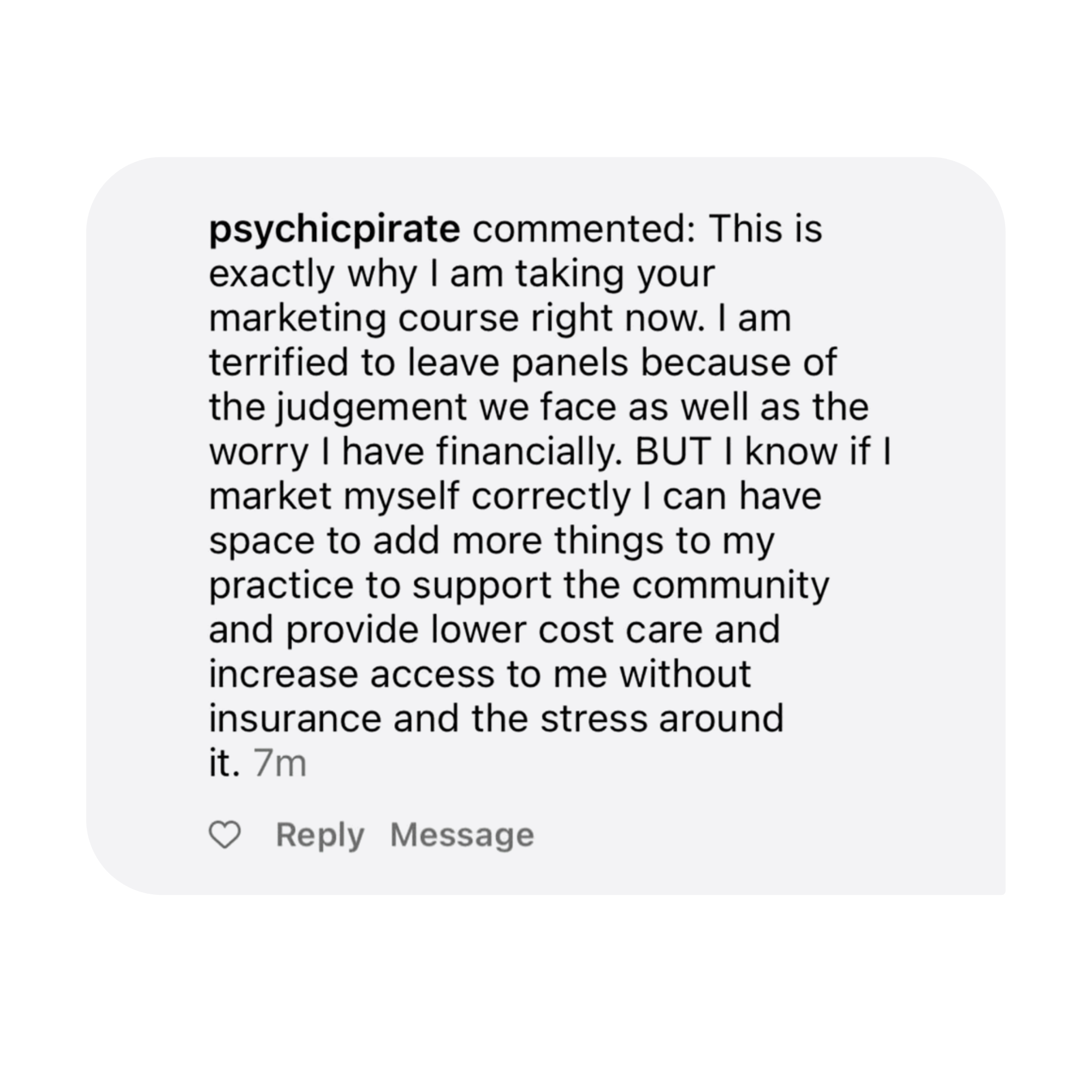
Marketing for
WITH
Therapists
AN ONLINE COURSE WITH THE INFORMATION, TIPS & TECHNIQUES YOU NEED TO GROW YOUR CASH-PAY PRIVATE PRACTICE

DO YOU HAVE A SOLID MARKETING PLAN TO PROMOTE YOUR PRIVATE PRACTICE?
This course equips you to fill your caseload with marketing strategies that match your strengths. From relational marketing to networking, SEO, Google Business Profiles, Instagram, and Facebook, I guide you in crafting a marketing plan aligned with your unique needs.
STEP 1
Fill Your Practice with Confidence
Craft a personalized marketing plan that aligns with your strengths and goals. With clear strategies for SEO, social media, and networking, you'll confidently attract the clients you’re looking for.
STEP 2
Build Relationships That Bring Clients
Learn the art of relational marketing and how to build connections with doctors, counselors, and other professionals. Master the skills to turn referrals into a steady stream of new clients.
STEP 3
Stand Out & Get Found
Boost your presence through SEO, Google Business Profiles, and social media. With proven techniques, you’ll make sure your practice is visible to the right clients in your community.

INTRODUCING
Marketing for Therapists
Everything You Need to Confidently Promote & Fill Your Private Practice
WHAT YOU’LL FIND INSIDE
Topics We Cover
STRATEGIC SUCCESS
Unleash Your Practice Potential
Start your private practice journey on the right foot with proven marketing strategies, a comprehensive six-month plan, expert guidance, and a step-by-step approach to filling your practice.
BRANDING & NICHES
Craft Your Practice Identity
Create a compelling brand and articulate a niche for your practice. This module teaches you how to craft a brand message that attracts your ideal clients using a storytelling approach.
REFERRAL RELATIONSHIPS
Relational Marketing Skills
Effectively market your practice to doctors, school counselors, community partners, and other therapists. I break down exactly what to say and do in order to build referral relationships.
WEBSITE EXCELLENCE
Create Your Online Presence
Optimize your website to convert inquiries into clients with my comprehensive website planner and gain valuable insights through examples of successful therapist websites.
CANVA ESSENTIALS
Elevate Your Brand
Learn how to use Canva to enhance your branding with step-by-step instructions and get started right away with 40 Instagram and Facebook templates and an essential lead magnet template.
SEO BASICS
Boost Online Visibility
Attract more clients with improved web visibility via three vital SEO techniques. Learn directly from guest expert Jennifer Pyle, who works with me on my own website SEO.
ENGAGING NEWSLETTERS
Connect with Your Audience
Discover practical tools for building your audience with an engaging email newsletter and lead magnet. This module includes three free templates for effective lead magnets.
GOOGLE SEARCH PROFILES
Local Search Power
Leverage the power of local online searches with my five strategies for improving your Google Business listing. This is a key strategy for gaining local therapy clients.
INSTAGRAM SUCCESS
Marketing for Therapists
Kickstart your Instagram growth with strategies that target and engage your ideal clients through reels, stories, and static posts. This module teaches you how to start building an audience
FACEBOOK (META) FOR THERAPISTS
Social Media Expertise
Get up-to-date on the latest techniques and strategies that will maximize your marketing efforts on Facebook. Hint: we talk a lot about leveraging therapist Facebook Groups.
DIRECTORY OPTIMIZATION
Maximizing Your Profiles
Implement practical steps to enhance and optimize your therapist directory profiles for referral potential, explore recommended directories, and gain insights directly from a mental health directory CEO.

What Therapists Are Saying
“I always dreamed of having my own private practice, but unfortunately, I’m not also a business person. Thankfully, I found the Private Practice Roadmap Course, and it’s been a game changer….It’s given me the confidence in myself where now I know I can do it.”
“THE PEACE OF MIND I NEEDED TO OPEN MY OWN PRIVATE PRACTICE”
“WITHIN A MONTH I OPENED MY OWN PRIVATE PRACTICE!”
“Now I have work-life balance, and I love what I do everyday. And it wouldn’t have happened without the Roadmap and Kelley’s programs. They helped me so much! I know they’ll help you too.”

GET STARTED NOW
Choose Your Plan
ONE TIME PAYMENT
$699
✓ 11 Modules
✓ Digital Workbook
✓ Access for the lifetime of the course
TWO PAYMENTS
$400
/month x2
✓ 11 Modules
✓ Digital Workbook
✓ Access for the lifetime of the course
WANT MORE?
Join The Private Practice Club
The Private Practice Club
Get the most out of your private practice with the The Private Practice Club.
A monthly membership designed to help you grow your private practice with clarity, confidence, and support. Inside, you’ll get instant access to Kelley Stevens’ two best-selling courses—The Roadmap Course and Marketing for Therapists—plus live monthly coaching calls, bonus trainings, and a private community of like-minded therapists.
This is your one-stop hub for strategy, mentorship, and sustainable momentum.

MEET YOUR COACH
I teach therapists how to build a successful, cash-pay private practice. Opening a six-figure private practice shouldn’t be complicated. That’s why I equip my clients with simple strategies and step-by-step guides.
I am an LMFT in Santa Barbara, CA with over a decade of experience in mental health and business development. I began my career as the marketing director of a large outpatient program in Los Angeles. After helping that business grow, I opened my own six figure private practice.
Life has a way of throwing us curve balls… so after five years in private practice, I moved and opened two more successful practices in new cities! I’m also an adjunct professor at Pepperdine University and Antioch University.
Now, I call Santa Barbara home. In my off time, I love playing with my toddler and spending time with my husband.
The Prelicensed in Practice Course
Your Step-by-Step Guide to Building Private Practice Foundations—Before You’re Fully Licensed
Inside Pre-Licensed in Practice, you’ll get the tools, clarity, and confidence to start preparing for private practice now—without waiting until you’re fully licensed. From defining your niche to understanding the legal and ethical guidelines, Kelley walks you through exactly what you can (and should) be doing as a pre-licensed therapist.

ANSWERS TO YOUR BURNING QUESTIONS
FAQS
-
Yes. You can take this course on your own time.
-
This course does not include a Simple Practice subscription. However, you can click here for a special discount.
-
We include a free bonus module filmed by Simple Practice that introduces their software and explains what features they offer for billing, documentation, and scheduling. This video is an overview of how to use their services in private practice but doesn’t teach you how to use the actual software. However, we provide you with a link to their free tutorials where you can learn to use Simple Practice if you decide to use them.
-
This course focuses exclusively on the business aspects of opening your private practice and does not include any marketing modules. The Private Practice Roadmap is meticulously designed to help you establish the solid business foundation for your practice. If you’re specifically seeking guidance on how to attract and fill your new private practice with clients, I invite you to explore my dedicated course, ‘Marketing for Therapists.’ It’s tailored to address your marketing needs. Discover more about it through the following link.
-
Although some private practice consultants will offer advice on this topic, this course recommends speaking with a small business attorney as well as your personal accountant. I’ll provide you with specially designed and detailed questions to ask them on this topic. This decision is based on the laws of the state and country you practice in and your very specific financial situation. Different business structures provide different liability considerations, tax considerations, and legal considerations. Any private practice coach who provides direct advice on this topic runs the risk of providing information that is outside of their scope, so I’d recommend speaking to a CPA or small business attorney.
-
Although some private practice consultants will offer advice on this topic, this course recommends speaking with a small business attorney as well as your personal accountant. I’ll provide you with specially designed and detailed questions to ask them on this topic. This decision is based on the laws of the state and country you practice in and your very specific financial situation. Different business structures provide different liability considerations, tax considerations, and legal considerations. Any private practice coach who provides direct advice on this topic runs the risk of providing information that is outside of their scope, so I’d recommend speaking to a CPA or small business attorney.
-
YES! If you are planning to have a private practice anytime in the future, this course will benefit you.
-
Yes! Although I offer a lot of free advice and content on Instagram, this course is much more detailed, structured, and geared toward a therapist looking to get serious about opening a private practice soon. My Instagram content is designed to be supplemental to the content covered in this course.
-
The Roadmap Course comes with a PDF course workbook. Additionally, you’ll receive a copy of the PDF Niche Workbook in the niche module.
-
No, the Roadmap Course does not include my scripts e-book, Say It Like a Pro, but it does include special coupon codes for all my other products in the course workbook.
-
No, the Roadmap Course does not include paperwork, but includes a 50% OFF coupon code for the paperwork packet. This code is located in your course workbook.
-
This course includes a bonus module taught by Simple Practice. Simple Practice is an electronic health record and contains a template library with dozens of pre-made templates that were created to streamline your documentation process. The templates are organized into three categories: Progress Notes, Intake Forms, and Assessments. Additionally, you can find free copies of these forms on the websites of most state licensing boards and/or professional organizations.
-
No, this course teaches you how to build a cash-pay private practice.
STILL HAVE QUESTIONS?
We're here to help—just ask!

































